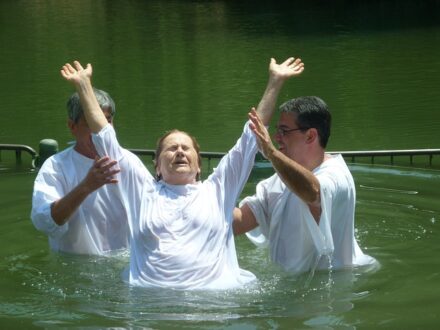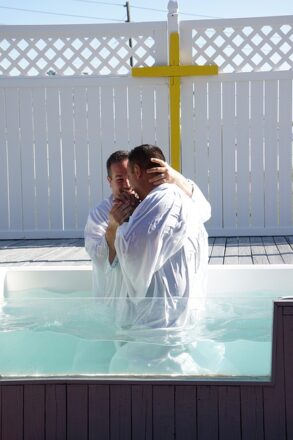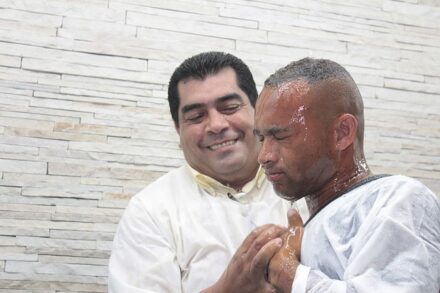I’m happy. I was concerned that I would have nightmares, that I would be so nervous I’d make myself sick, that I’d have last minute doubts… that I’d get food poisoning and wouldn’t be able to go. LOL
None of that happened. For me, getting re-baptized was the best thing I could have done at this point. I wanted it to be a faith thing, and it very much was. I didn’t want it to be a denial of anything I’d already experienced. There was only one person who didn’t understand who said anything. I didn’t try to correct her–I met her in a Bible study a few weeks ago and knew she had very little understanding of a whole lot of things. My decision would have confused her, so I stayed quiet.
Baptism was a very important thing to me. I stayed in Oneness churches, miserable, for nearly ten years simply because they baptized in Jesus’ name and no one else did. Standards played a very small roll, and worship styles and “moves of the Holy Ghost” played probably an even smaller one for most of those years. But baptism to me was huge.
I do have to say that the pastor was great today. I’m not sure how I would have reacted if he hadn’t said some of the things he did last week and this. He was careful both last Sunday when I joined and this Sunday when I was baptized to explain that I had been a Christian for “awhile.” Today he mentioned (without letting anyone know who had asked) that he’d been asked several questions about baptism recently. He then restated the answers he’d given to those (my) questions. Remembering those questions and answers at that moment was encouraging and reassuring to me. He also restated the meaning of baptism as signifying the death, burial and resurrection of Jesus, which holds a whole lot of meaning for me. Though those may all be common practice for him, the significance for me was very meaningful.
Also, the words he said as he baptized us–and maybe he always does, I don’t know–was something like, “by the authority of Jesus Christ, upon your confession of faith and trust in Him, I now baptize you in the name of the Father, the Son, and the Holy Ghost.” That was really terrific. Any last minute concerns I might have had were gone after the first person he baptized that way. (hee hee I’d wondered if I might get there and in my mind be saying “in the name of Jesus, in the name of Jesus” but I didn’t!)
For me, it feels like things have come full circle. When I joined the United Pentecostal Church, I was told that I hadn’t really been a Christian before. But I was, and I couldn’t deny that. It put me on shaky ground. They told me one thing, I believed another, yet I believed what they preached about baptism and the Holy Ghost–the same things they used to say that I hadn’t been a Christian before I started attending their church. Things just felt out of kilter.
Over the last year and a half, there have been several times that it seemed like another piece fell into place and I regained a bit more balance. A few months after leaving, for instance, during an invitational at the church I then attended, they led “whosoever will” in a “sinner’s prayer.” At my pew that day, I modified that prayer to a re-commitment to Jesus, asking His forgiveness for my lack of understanding (through the years of trying to follow a church, organization or man, and trying to please people rather than Him), and asking His direction from that point. That was a wonderful day. It felt like the pieces reconnected somehow, that I could finally accept what had made a huge impact in my life as a child–accepting Jesus as my Savior. (Something strongly taught against in the Oneness churches I’ve been in.)
There have been several other times that it seemed like a piece would fall into place–talking to a pastor and questioning him without being rebuked, leaving one church for another and still being accepted at both, learning what others truly believe and finding out that I agree… and etc.
That really has little to do with baptism in itself. Someone else will find that balance and that feeling of fitting or of all the pieces falling in place another way. No matter where or how that balance is found, I hope we all find it. But for me, there was huge significance in that simple act today.
For me it was just a very, very good experience.








